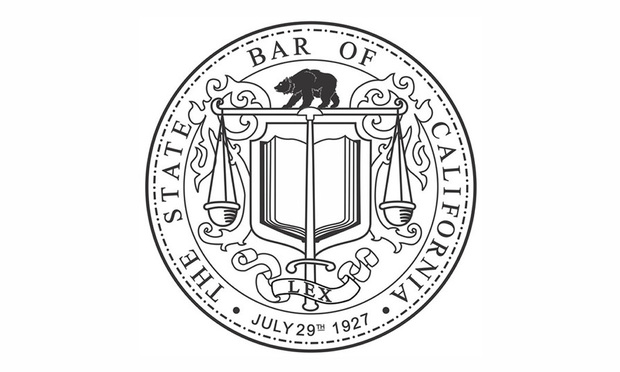California Task Force Recommends Limited Fee-Sharing, 'Regulatory Sandbox'
"I think there was a lot of unanimity. There were a few splits but overall it was a great group of people marching to the same drummer in trying to close the justice gap," said Justice Lee Smalley Edmon of the Second District, Division Three of the California Court of Appeals, the task force chairwoman.
February 24, 2020 at 07:37 PM
3 minute read
 State Bar of California's logo.
State Bar of California's logo.
A state bar committee on Monday moved to put the final touches on a set of proposals that members hope will expand the availability of legal help to Californians.
The Task Force on Access Through Innovation of Legal Services approved eight recommendations that will go to the bar's board of trustees next month and likely reignite the debate over the most controversial ideas.
The task force stopped short of calling for immediate changes that would allow non-lawyers to take an ownership stake in law firms. The group also opted for only a modest expansion of fee-sharing.
Instead, the 22 members pinned many of their hopes for reform on the creation of a trial program for entrepreneurs known as the "regulatory sandbox."
"It's very exciting," said the task force chairwoman, Justice Lee Smalley Edmon of the Second District, Division Three of the California Court of Appeals. "I think there was a lot of unanimity. There were a few splits, but overall it was a great group of people marching to the same drummer in trying to close the justice gap."
The proposals include:
- Expanding Rule of Professional Conduct 5.4 to allow lawyers to share non-court-awarded fees, such as those obtained through a settlement, with nonprofits. The proposal does not include businesses and other for-profit organizations.
- The creation of a pilot program, or regulatory sandbox, that would allow regulators to free participants of traditional restrictions on the unlicensed practice of law so they can develop legal services or products for underserved members of the public. Regulators would monitor participants during the trial period and collect data on how well the covered service operates.
- Asking for additional study of allowing non-lawyers to own law firms and other alternative ownership models. This proposal proved one of the most controversial for both the task force and members of the bar. In recommendation language added Monday, the task force said, "a substantial majority of the members agree that additional revisions may be warranted but that further study and data informing the specifics of these revisions is needed. Some believe that a regulatory sandbox will provide informative data while others believe that further changes to Rule 5.4 may be studied regardless of the sandbox."
- Easing restrictions on legal advertising to potentially expand lawyer referral services. Such changes could allow a business to offer consumers "a combination of online matching activities, limited scope representation, legal document production and/or a prepaid or subscription-based legal services plan," the task force report said.
The recommendations are scheduled to go to the bar's board of trustees March 12. Many of the proposals will require a public comment period, the formation of new committees to develop rules and the blessing of the California Supreme Court—and possibly the Legislature.
"The creation of a regulatory sandbox, the development of a regulatory body—it's going to take some time," Edmon said. "I'm hopeful that the board of trustees will approve the recommendations and then immediately create these bodies to take the next stop."
Read more:
The Fight Over the Future of Law Firm Ownership Has Put an Industry at Odds
California's Plan for Legal Fee Sharing, 'Regulatory Sandbox' Take Final Shape
This content has been archived. It is available through our partners, LexisNexis® and Bloomberg Law.
To view this content, please continue to their sites.
Not a Lexis Subscriber?
Subscribe Now
Not a Bloomberg Law Subscriber?
Subscribe Now
NOT FOR REPRINT
© 2025 ALM Global, LLC, All Rights Reserved. Request academic re-use from www.copyright.com. All other uses, submit a request to [email protected]. For more information visit Asset & Logo Licensing.
You Might Like
View All

Cleary Nabs Public Company Advisory Practice Head From Orrick in San Francisco

The Rise of Female Breadwinners: Challenging Traditional Divorce Dynamics
4 minute read
An Overview of Proposed Changes to the Federal Rules of Procedure Relating to the Expansion of Remote Trial Testimony
15 minute readTrending Stories
- 1Settlement Allows Spouses of U.S. Citizens to Reopen Removal Proceedings
- 2CFPB Resolves Flurry of Enforcement Actions in Biden's Final Week
- 3Judge Orders SoCal Edison to Preserve Evidence Relating to Los Angeles Wildfires
- 4Legal Community Luminaries Honored at New York State Bar Association’s Annual Meeting
- 5The Week in Data Jan. 21: A Look at Legal Industry Trends by the Numbers
Who Got The Work
J. Brugh Lower of Gibbons has entered an appearance for industrial equipment supplier Devco Corporation in a pending trademark infringement lawsuit. The suit, accusing the defendant of selling knock-off Graco products, was filed Dec. 18 in New Jersey District Court by Rivkin Radler on behalf of Graco Inc. and Graco Minnesota. The case, assigned to U.S. District Judge Zahid N. Quraishi, is 3:24-cv-11294, Graco Inc. et al v. Devco Corporation.
Who Got The Work
Rebecca Maller-Stein and Kent A. Yalowitz of Arnold & Porter Kaye Scholer have entered their appearances for Hanaco Venture Capital and its executives, Lior Prosor and David Frankel, in a pending securities lawsuit. The action, filed on Dec. 24 in New York Southern District Court by Zell, Aron & Co. on behalf of Goldeneye Advisors, accuses the defendants of negligently and fraudulently managing the plaintiff's $1 million investment. The case, assigned to U.S. District Judge Vernon S. Broderick, is 1:24-cv-09918, Goldeneye Advisors, LLC v. Hanaco Venture Capital, Ltd. et al.
Who Got The Work
Attorneys from A&O Shearman has stepped in as defense counsel for Toronto-Dominion Bank and other defendants in a pending securities class action. The suit, filed Dec. 11 in New York Southern District Court by Bleichmar Fonti & Auld, accuses the defendants of concealing the bank's 'pervasive' deficiencies in regards to its compliance with the Bank Secrecy Act and the quality of its anti-money laundering controls. The case, assigned to U.S. District Judge Arun Subramanian, is 1:24-cv-09445, Gonzalez v. The Toronto-Dominion Bank et al.
Who Got The Work
Crown Castle International, a Pennsylvania company providing shared communications infrastructure, has turned to Luke D. Wolf of Gordon Rees Scully Mansukhani to fend off a pending breach-of-contract lawsuit. The court action, filed Nov. 25 in Michigan Eastern District Court by Hooper Hathaway PC on behalf of The Town Residences LLC, accuses Crown Castle of failing to transfer approximately $30,000 in utility payments from T-Mobile in breach of a roof-top lease and assignment agreement. The case, assigned to U.S. District Judge Susan K. Declercq, is 2:24-cv-13131, The Town Residences LLC v. T-Mobile US, Inc. et al.
Who Got The Work
Wilfred P. Coronato and Daniel M. Schwartz of McCarter & English have stepped in as defense counsel to Electrolux Home Products Inc. in a pending product liability lawsuit. The court action, filed Nov. 26 in New York Eastern District Court by Poulos Lopiccolo PC and Nagel Rice LLP on behalf of David Stern, alleges that the defendant's refrigerators’ drawers and shelving repeatedly break and fall apart within months after purchase. The case, assigned to U.S. District Judge Joan M. Azrack, is 2:24-cv-08204, Stern v. Electrolux Home Products, Inc.
Featured Firms
Law Offices of Gary Martin Hays & Associates, P.C.
(470) 294-1674
Law Offices of Mark E. Salomone
(857) 444-6468
Smith & Hassler
(713) 739-1250






